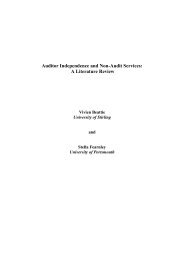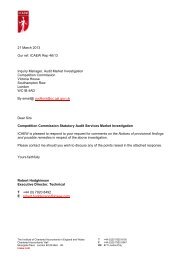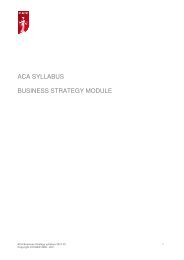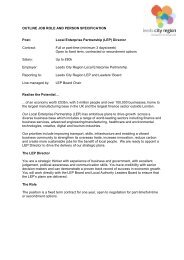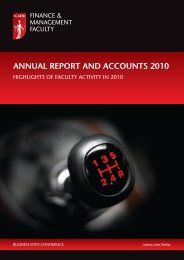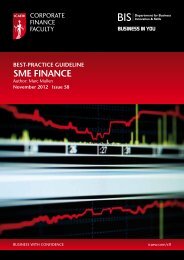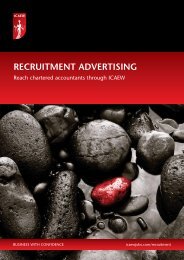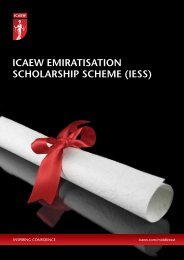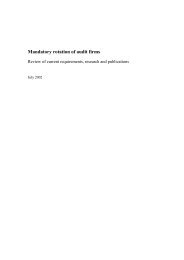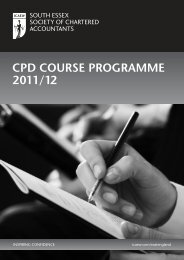9. IMPLEMENTATION9.1 Carrot, stick or sermon9.1.1 MotivationIf a proposed action is considered to be <strong>in</strong> <strong>the</strong> <strong>public</strong> <strong>in</strong>terest, it follows that it is <strong>for</strong> <strong>the</strong> <strong>public</strong>benefit that <strong>the</strong> action actually happens. Someth<strong>in</strong>g will be more likely to happen if people aremotivated to undertake or at least support it.The first need <strong>in</strong> this respect is <strong>for</strong> <strong>the</strong> proposed action to be understood and agreed. It willhelp to reduce <strong>the</strong> risk of error if <strong>the</strong> proposition is clear and precise, able to withstand criticalreflection, consistent, and hav<strong>in</strong>g consensus. 201The next requirement is <strong>for</strong> <strong>the</strong>re to be a motivation to comply. Behavioural economicsrecognises that people do not necessarily behave rationally and are motivated by a variety offactors, considered below.The issue is exacerbated when <strong>the</strong> impact will be felt <strong>in</strong>ternationally: even where people aremotivated to do <strong>the</strong> ‘right’ th<strong>in</strong>g’, different cultures tend to have different perspectives on what<strong>the</strong> ‘right’ th<strong>in</strong>g to do is.9.1.2 Human natureFirst, self-<strong>in</strong>terest. Hobbes noted that, unlike ants and bees, people do not behave sociably as anatural state of affairs. 202 This has been attributed to a number of factors:• a tendency to: compete <strong>for</strong> honour and dignity; desire pre-em<strong>in</strong>ence; <strong>in</strong>terfere to re<strong>for</strong>mo<strong>the</strong>rs (but not <strong>the</strong>mselves); use words to misrepresent; and imag<strong>in</strong>e <strong>in</strong>juries when at rest. 203• re<strong>in</strong><strong>for</strong>c<strong>in</strong>g this is our ‘fallible reason, re<strong>in</strong><strong>for</strong>ced by passions, and our diverse abilities, whichare <strong>the</strong> source of property rights and which result <strong>in</strong> conflict’. 204• motivation by selfishness and greed <strong>for</strong> esteem, by self and o<strong>the</strong>rs. 205Given that <strong>the</strong>y exist, self-<strong>in</strong>terest and ego have long been used as motivational tools to makepeople do what <strong>the</strong> <strong>public</strong> <strong>in</strong> general (usually through government) wants <strong>the</strong>m to do. 206Whe<strong>the</strong>r people act <strong>in</strong> <strong>the</strong> <strong>in</strong>terests of o<strong>the</strong>rs through genu<strong>in</strong>e concern or esteem could beconsidered to be irrelevant here, although from an aggregate qualitative perspective, egoism isa zero-sum game but self-respect creates humanity and virtue. 207In addition, human nature makes us prone to:• follow<strong>in</strong>g herd <strong>in</strong>st<strong>in</strong>ct or ‘group th<strong>in</strong>k’; 208• a conservative tendency to stop while <strong>the</strong> go<strong>in</strong>g is good, or conversely keep plough<strong>in</strong>g onif do<strong>in</strong>g badly; 209• be<strong>in</strong>g risk averse: we are more concerned to avoid small losses than make small ga<strong>in</strong>s,accept<strong>in</strong>g a low probability of a high loss, but not vice versa. Similarly we will accept a highprobability of a low ga<strong>in</strong> but not vice versa. This can cause <strong>in</strong>surance or safety nets to result<strong>in</strong> moral hazard, as we adjust behaviour to our risk tolerance levels; 210• be<strong>in</strong>g, conversely, over confident <strong>in</strong> our own judgement; 211201Sidgwick, quoted <strong>in</strong> Schultz, ‘Henry Sidgwick’.202Quoted <strong>in</strong> Faulhaber, ‘The Rise and Fall of “Self Interest”’.203Hobbes, quoted <strong>in</strong> Faulhaber, ibid.204Madison, quoted <strong>in</strong> Faulhaber, ibid.205Mandeville referred to by Hundert, The Fable of <strong>the</strong> Bees and O<strong>the</strong>r Writ<strong>in</strong>gs.206Machiavelli, quoted <strong>in</strong> Faulhaber, ‘The Rise and Fall of ‘Self Interest’’.207Rousseau, quoted <strong>in</strong> Faulhaber, ibid.208Marnet, ‘History Repeats Itself: The Failure of Rational Choice Models <strong>in</strong> Corporate Governance’.209BBC News, ‘Hormones May Fuel Market Crises’.210Kay, The Truth About Markets.211Kay, ibid.62Implementation
• giv<strong>in</strong>g up where targets seem unatta<strong>in</strong>able; 212• unconscious bias towards what suits us; 213• over commitment to prior decisions to avoid acknowledg<strong>in</strong>g error; 214• satisfic<strong>in</strong>g ra<strong>the</strong>r than optimis<strong>in</strong>g, as heuristic ‘mental shortcut’ behaviour applies priorexperience and first impressions through rules of thumb; 215 216 and• becom<strong>in</strong>g suspicious where <strong>the</strong>re is <strong>in</strong><strong>for</strong>mation asymmetry. 217It follows from <strong>the</strong> last po<strong>in</strong>t above that <strong>the</strong> perceived trustworth<strong>in</strong>ess of those responsible <strong>for</strong> a<strong>public</strong> <strong>in</strong>terest action will directly affect reaction to it. For example, <strong>the</strong> widespread belief <strong>in</strong> <strong>the</strong>UK that roadside speed cameras are revenue-generat<strong>in</strong>g devices ra<strong>the</strong>r than to enhance safetydiscourages will<strong>in</strong>g compliance.H<strong>in</strong>dsight research <strong>in</strong>to <strong>the</strong> causes of erroneous decisions suggests that we are <strong>in</strong>fluenced bypast experiences, prejudgements and attachments that can lead us to mislead<strong>in</strong>g conclusionsabout current situations. 218It is important <strong>for</strong> those responsible <strong>for</strong> implement<strong>in</strong>g <strong>public</strong> <strong>in</strong>terest measures to work on <strong>the</strong>assumption that people will react based on human nature as it is, ra<strong>the</strong>r than as it ‘should be’.Earlier thought leadership work by <strong>ICAEW</strong> analyses <strong>the</strong> record of <strong>the</strong> UK government’s childand work<strong>in</strong>g tax credit system, <strong>in</strong>troduced <strong>in</strong> 2003. 219 It resulted <strong>in</strong> massive over- and underpaymentsand several <strong>in</strong>vestigations were carried out. The problems were at least partiallyattributed to lack of <strong>in</strong><strong>for</strong>mation, and over-complexity, which put people off claim<strong>in</strong>g, orresulted <strong>in</strong> <strong>in</strong>correct claims. This seems to be a clear example of someth<strong>in</strong>g done on <strong>the</strong> basisof how it was thought people ‘ought’ to behave, ra<strong>the</strong>r than how <strong>the</strong>y actually do.9.1.3 PresumptionThen <strong>the</strong>re is <strong>the</strong> issue of whe<strong>the</strong>r people should be treated as <strong>in</strong>nocent until proven guiltyor vice versa: should any system of government assume ‘all people are knaves’? 220We started this report observ<strong>in</strong>g that <strong>in</strong> most societies, <strong>the</strong>re is a basic presumption thatpeople should be able to go about <strong>the</strong>ir legitimate bus<strong>in</strong>ess. Sometimes ‘legitimate’ isunclear – <strong>for</strong> example where what is legal and <strong>the</strong> greyer area of what is ‘just’ do not overlap.Never<strong>the</strong>less, an assumption of guilt unless <strong>in</strong>nocence is proven does not sit easily with this.There is also a risk that a presumption of guilt will result <strong>in</strong> sub-optimal regulation: such apresumption is likely to result <strong>in</strong> an economically worse outcome than that of a system basedon a different presumption, unless <strong>the</strong>re is reason to suppose that most of those regulatedactually are likely to misbehave. 2219.1.4 The approach to implementationThe approach <strong>for</strong> <strong>the</strong> implementer to use will take <strong>the</strong> above factors <strong>in</strong>to account but willalso depend on <strong>the</strong> degree of constra<strong>in</strong>t <strong>in</strong>tended and <strong>the</strong> extent to which it is expectedthat <strong>the</strong>re is already a propensity <strong>for</strong> people to do what is wanted of <strong>the</strong>m:• Deviation from <strong>the</strong> normCompulsion through law, regulation and en<strong>for</strong>cement creates <strong>the</strong> maximum amountof constra<strong>in</strong>t <strong>in</strong> terms of comply<strong>in</strong>g with what is required (at least <strong>in</strong> <strong>the</strong> short term).An <strong>in</strong><strong>for</strong>mation approach achieves <strong>the</strong> least constra<strong>in</strong>t and <strong>in</strong>centives come somewhere<strong>in</strong> between.• Alignment of requirement with self-<strong>in</strong>terestIncentives can be used to promote behaviour through self-<strong>in</strong>terest, but law or regulationis likely to be more effective where <strong>the</strong> desire is to change behaviour <strong>in</strong> a manner thatwould o<strong>the</strong>rwise be resisted. Where <strong>the</strong>re is already a self-<strong>in</strong>terest <strong>in</strong> do<strong>in</strong>g what is wantedor it is likely that <strong>in</strong>built values will cause <strong>the</strong> required behaviour, <strong>in</strong><strong>for</strong>mation is likely tobe more effective.212Ciulla, ‘Ethics and Leadership Effectiveness’.213Bazerman quoted <strong>in</strong> Marnet, ‘History Repeats Itself: The Failure of Rational Choice Models <strong>in</strong> Corporate Governance’.214Marnet, ibid.215Marnet, ibid.216Kay, The Truth About Markets.217Kay, ibid.218F<strong>in</strong>kelste<strong>in</strong>, Whitehead and Campbell, ‘Th<strong>in</strong>k Aga<strong>in</strong>: Why Good Leaders Make Bad Decisions and How to Keep it from Happen<strong>in</strong>gto You’.219<strong>ICAEW</strong>, In<strong>for</strong>mation <strong>for</strong> Markets and Society.220Hume, referred to <strong>in</strong> Engelen, ‘Th<strong>in</strong>k<strong>in</strong>g Th<strong>in</strong>gs Through: The Value and Limitations of James Buchanan’s Public Choice Theory’.221Engelen, ibid.Implementation63
- Page 1 and 2:
ACTING IN THE PUBLIC INTEREST:A FRA
- Page 3:
ACTING IN THE PUBLIC INTEREST:A FRA
- Page 9:
Our framework is based around the k
- Page 12 and 13:
The answers to these questions will
- Page 14 and 15:
2. INTRODUCTION2.1 Concepts of the
- Page 16 and 17: Accordingly, this report addresses
- Page 18 and 19: Panel 2.4: ICAEW and its public int
- Page 20 and 21: The Mediterranean republics needed
- Page 22 and 23: We set out a framework for discussi
- Page 24 and 25: 3. CREDENTIALS FOR INVOKINGTHE PUBL
- Page 26 and 27: By and large producers operate in s
- Page 29 and 30: the UK government set up a ‘Commi
- Page 31 and 32: 4. APPLICABILITY OF THE PUBLIC INTE
- Page 33 and 34: to be a public interest matter: fir
- Page 35: This highlights that there may be p
- Page 38 and 39: 5. THE RELEVANT PUBLIC5.1 ScopeIn o
- Page 40 and 41: 5.3 Geographical exclusionsGeograph
- Page 42 and 43: 6. THE RELEVANT PUBLIC’S WANTS6.1
- Page 44 and 45: • work, that is having some, havi
- Page 46 and 47: Panel 6.3: Weisbrod’s public inte
- Page 48 and 49: Having sought out representative op
- Page 50 and 51: 7. CONSTRAINTS TO WANTS7.1 Self-int
- Page 52 and 53: In terms of whether the relevant pu
- Page 54 and 55: Panel 7.5: Management of national d
- Page 56 and 57: Panel 7.6: ICAEW and clarity of val
- Page 58 and 59: 8. AGGREGATION AND DECISION8.1 Base
- Page 60 and 61: Other ethical decision-making model
- Page 62 and 63: In this instance, while national se
- Page 65: 9. IMPLEMENTATIONA proposed action
- Page 69 and 70: 9.2.1 Government authorityAt the st
- Page 71 and 72: 9.3 Infrastructure and support tool
- Page 73 and 74: 12. The framework proposes a signif
- Page 75 and 76: ibliographyAdler, Jonathan H, Perve
- Page 77 and 78: Goldstein, Eric A, ‘Defining the
- Page 79 and 80: Persky, Joseph, ‘Retrospectives:
- Page 81: The ICAEW is a founder member of th



